

The Writing Café. S Laws of Fantasy. This page has three distinct parts: Watt-Evans' First Law of Fantasy: Stories are about people.Watt-Evans' Second Law of Fantasy: People are never wholly good or wholly evil, and therefore characters should never be wholly good or wholly evil.Watt-Evans' Third Law of Fantasy: The basic human motivations are universal.Watt-Evans' Fourth Law of Fantasy: Everything other than the basic human motivations will vary, depending on the cultural setting.Watt-Evans' Fifth Law of Fantasy: Magic, like everything else, has rules.Watt-Evans' Sixth Law of Fantasy: If a story can be written without a fantasy element, then don't bother with the fantasy element.
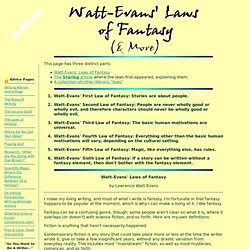
Watt-Evans' Laws of Fantasy by Lawrence Watt-Evans I make my living writing, and most of what I write is fantasy. I'm fortunate in that fantasy happens to be popular at the moment, which is why I can make a living at it. Fiction is anything that hasn't necessarily happened. Any fiction not meeting the three preceding definitions is fantasy. Back to. Magic realism. Magic realism or magical realism is a genre where magic elements are a natural part in an otherwise mundane, realistic environment.[1] Although it is most commonly used as a literary genre, magic realism also applies to film and the visual arts.
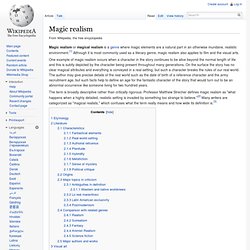
One example of magic realism occurs when a character in the story continues to be alive beyond the normal length of life and this is subtly depicted by the character being present throughout many generations. On the surface the story has no clear magical attributes and everything is conveyed in a real setting, but such a character breaks the rules of our real world. The author may give precise details of the real world such as the date of birth of a reference character and the army recruitment age, but such facts help to define an age for the fantastic character of the story that would turn out to be an abnormal occurrence like someone living for two hundred years. Etymology[edit] Literature[edit] Characteristics[edit] Fantastical elements[edit] Fantasy. Fairy tales and legends, such as Dobrynya Nikitich's rescue of Zabava Putyatichna from the dragon Gorynych, have been an important source for fantasy.
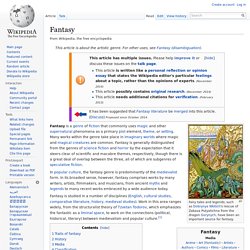
In popular culture, the fantasy genre is predominantly of the medievalist form. In its broadest sense, however, fantasy comprises works by many writers, artists, filmmakers, and musicians, from ancient myths and legends to many recent works embraced by a wide audience today. Fantasy is studied in a number of disciplines (English, cultural studies, comparative literature, history, medieval studies). Work in this area ranges widely, from the structuralist theory of Tzvetan Todorov, which emphasizes the fantastic as a liminal space, to work on the connections (political, historical, literary) between medievalism and popular culture.[1] Traits of fantasy[edit] History[edit] Many works are unclear as to the belief of the authors in the marvels they contain, as in the enchanted garden from the Decameron.
Media[edit] 2. Writing Fantasy: Tools & Techniques. A.
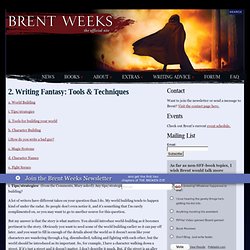
World Building i. Tips/strategies ii. Tools for building your world b. I.How do you write a bad guy? C. D. E. A. I. A lot of writers have different takes on your question than I do. But my answer is that the story is what matters. There are more and less elegant solutions to the problem of how you set up an entire world and lay the ground rules quickly. Ii. I’m not going to be able to do justice to your question about world-building in one short post here. The world-building has to occur along sort of two tracks: first, you need to set up a lot of things that you absolutely know about the world.
Secondly, you’re going to have to think about just how the world works. So along that first track of thinking, you, outside of the fiction, need to make all of these decisions about how the world actually works. Third, do things differently. Fourth, now you have to put all of this into practice. Go forth and build worlds! B. I’m not going to snow you here. So, how do you write great characters? Building Stronger Story Themes. By Timothy Pontious Strong stories are built on strong thematic elements, or combinations of many strong elements.
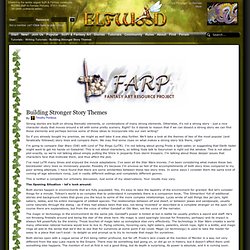
Otherwise, it's not a strong story - just a nice character study that moves around a bit with some pretty scenery. Right? So it stands to reason that if we can dissect a strong story we can find those elements and perhaps borrow some of those ideas to incorporate into our own writing? So if you already bought my premise, we might as well take it one step further.